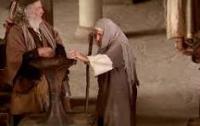
In today’s gospel, Mark has skilfully placed Jesus’ denunciation of the scribes together with the story of the widow and her mite. Many books of the Old Testament speak about protecting vulnerable people like widows. The scribes would have been very familiar with Exodus, Psalms, Proverbs and the prophets Isaiah and Jeremiah, all of whom speak on that subject. Without male support and with nothing like modern social protection, a widow could be destitute. Jesus talked about the scribes swallowing up widows’ property. A scribe had similar functions to a modern solicitor was often appointed by men in the their wills to act as executor of their estates. It would not be difficult to cheat the widow, having been given such power. Also, the leaders of that society should not have put pressure on the poor to pay the temple tax when they were not obliged to do so.
Jesus noticed the poor widow putting in her coins. He was probably the only one who did. The collection boxes (there were thirteen) were in the shape of a horn. People contributing a great many coins could make a lot of noise as the money dropped in. The widow’s contribution would have scarcely made a sound. It was one of the ways that the scribes and pharisee could show off their piety. They also seemed to have worn long showy robes and to have paraded themselves in public. The contrast between their ostentation and the figure of the poor woman, probably dressed in shabby clothes, would have been stark.